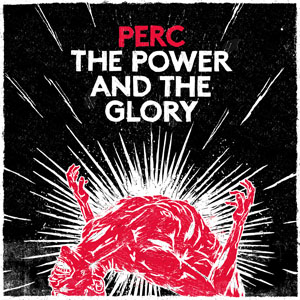Perc The Power and the Glory
A recurring point of interest in the press releases, interviews, and promotional efforts leading up […]

A recurring point of interest in the press releases, interviews, and promotional efforts leading up to the release of The Power and the Glory—the second LP from veteran English producer Ali Wells’ (a.k.a. Perc)—has been the album’s intentional political thread. The record’s title could easily be taken to represent the driving force behind political ladder climbers, and track titles like “David & George” (references to British Prime Minister David Cameron and George Osborne, head of the country’s economic affairs) and “Bleeding Colours” can certainly lend themselves to political interpretation. However, despite these inclinations, The Power and the Glory is not some kind of a call to arms or a “protest” album of any sort; instead, the blistering, 10-track effort seems to be more about Wells internalizing his own frustration, whether it’s with self-serving political systems or the current rise of cookie-cutter dance music in the UK and beyond.
Some cuts on The Power and the Glory express this frustration more obviously than others. The record’s two opening efforts, “Rotting Sound” and “Speek,” force their guest vocalists—Dan Chandler of London outfit Dethscalator and Nik Colk Void of Factory Floor, respectively—to each push through menacing sheets of distortion and walloping machine rhythms. While Chandler elects to scream, Colk Void conversely uses a monotone delivery bathed in FX processing. Still, the metaphor remains the same: in the modern age, one has to push through a lot of noise to be heard. When Chandler resurfaces towards the end of the album on “Take Your Body Off” (one of the LP’s more club-appropriate efforts), his words are largely still incomprehensible, but they aren’t quite as buried beneath sonic detritus. Appearing only in the track’s second half, his occasional screams instead use the momentum of the production’s monstrous pulses and factory-burnt soundscapes as platforms to push his voice further. In doing so, “Take Your Body Off” serves as a smart contrast to “Rotting Sound” and stands as a clear indication that—much like he did on his lauded debut LP, Wicker and Steel—Wells has crafted his latest album as a complete piece of work, not merely a collection of individual songs.
The aforementioned “David & George” shows Wells’ political ambitions most transparently. It’s a four-plus-minute exercise full of maddening percussion, shape-shifting distortion, and evil, cackling laughter, and these elements combine to offer a darkly slanted interpretation of what it’s like to be on the receiving end of the decisions being made by policy makers like David Cameron and George Osborne. From a musical perspective, the track is a challenging listen, but as a conceptual statement, there’s little question that “David & George” succeeds in its aims.
Truthfully, this tendency rings true for much of The Power and the Glory, as the record’s implied mission statement is frequently seen to a logical end, but from a purely listening standpoint, the music is not easy to digest. However, this feels entirely by design. Across the album’s 10 tracks, Perc lands himself in a number of sonic landscapes—”Rotting Sound” and “Bleeding Colours” use unconventional structures and employ harsh tones; “Lurch” digs deep into half-time techno abstraction; “Horse Gum” and “A Living End” wallow in unsettling ambience. Two productions in particular, “Galloper” and “Dumpster,” even reach out to DJs, giving them a bit of heavy-handed techno that’s easier to swallow than the majority of the record. This eagerness to explore various tempos and structures seems to embody Wells’ frustration with the fit-to-form feel that characterizes so much of dance music. If that world is so concerned with staying within defined lines (perhaps in order to ensure commercial success), Wells is just as eager to jump around, between, and outside of UK techno’s perceived boundaries. Fortunately, his production chops are more than capable of helping listeners to make these leaps with him, and although the flow can be jarring, one never gets the sense that Perc intended it to be any other way.
The Power and the Glory is an impressive effort, one where its creator uses his frustrations with the powers that be as raw fuel, rather than simply regurgitating his ire in an obvious fashion. It’s not the easiest path to take, but Wells’ choices do nothing to detract from the LP’s, ahem, power. When it comes to pushing the sonic and conceptual limits of techno, Perc is largely operating in a class by himself.

